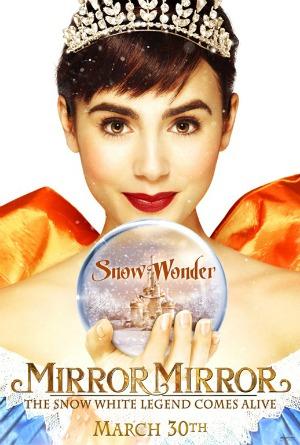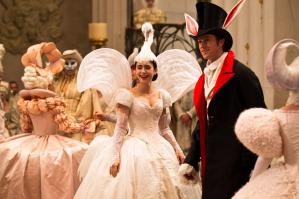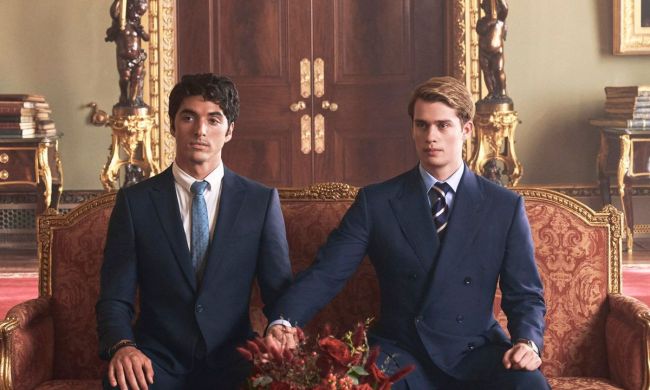 The tale of Snow White and the Seven Dwarves has been reinvented, reimagined, and retold countless times over the last two centuries, but this year brings us not one but two feature films based on the classic story by the Brothers Grimm. The first of those films arrives in theaters this weekend, with director Tarsem Singh’s Mirror Mirror offering a lighthearted, family-friendly spin on the well-known story of an evil queen, a charming prince, and of course, a beautiful princess and seven dwarves.
The tale of Snow White and the Seven Dwarves has been reinvented, reimagined, and retold countless times over the last two centuries, but this year brings us not one but two feature films based on the classic story by the Brothers Grimm. The first of those films arrives in theaters this weekend, with director Tarsem Singh’s Mirror Mirror offering a lighthearted, family-friendly spin on the well-known story of an evil queen, a charming prince, and of course, a beautiful princess and seven dwarves.
Known for a unique visual flair that made him one of the most sought-after directors for music videos and commercials before catching the eye of move audiences with his debut film The Cell, Singh is venturing into unfamiliar territory with Mirror Mirror, his first PG-rated, family-friendly feature. The film stars veteran actress Julia Roberts as The Queen, Lily Collins (Priest) as Snow White, and Armie Hammer (The Social Network) as Prince Alcott.
Like all of Singh’s films, Mirror Mirror makes it clear right from the start that the audience is in for one of the director’s signature visual experiences, introducing the key characters through an animated sequence that manages to be both captivating and a little disconcerting, thanks to the animator’s use of human eyes set within the animated characters. It’s a storytelling decision that feels entirely appropriate for a fairy tale told through the lens of Singh’s camera, and establishes a nice balance of wonder and dread.
Still, there’s quite a bit of Mirror Mirror that breaks from the grim, moody projects its director is known for.

Tonally, Mirror Mirror is the photo-negative of films like The Cell and Immortals. Where his earlier films were dark, serious, and filled with death, Mirror Mirror is bright, fun, and celebrates life. This cinematic U-turn extends to the film’s characters too, with Mirror Mirror offering up vibrant performances played for laughs instead of the painfully earnest, tortured souls that populated Singh’s previous films.
While it’s no surprise that Roberts gleefully owns every scene she appears in and seems to genuinely enjoy her role as the film’s comically evil Queen, the seven actors playing the dwarves are the film’s real treat. Rather than opting for an endless parade of tired jokes about their height, Mirror Mirror gives the audience a group of dwarves whose comedic moments come from witty dialogue and the actors’ great sense of timing. This results in laughs that are not only intentional, but sincere — and a desire to see more of the dwarves than you get in the film.

However, where Roberts and the dwarves thrive in Mirror Mirror, Collins and (to a lesser degree) Hammer never quite find their footing in the playful world Singh has created around them. Hammer has his moments as the charming Prince Alcott, but he shares far too many scenes with Roberts, who’s clearly the focal point of Singh’s attention, and therefore the audience’s attention, too. Sadly, Collins feels more like a placeholder as Snow White, and does little to make the character her own. Whether it’s Collins’ performance, a lack of character development in the script, or Singh’s decision to focus on The Queen’s side of the story, it’s difficult to find reasons to care about Snow White in this version of the tale.
Mirror Mirror isn’t a complete break from Singh’s comfort zone, though, as it offers a nice feast for the eyes and some impressive technical achievements. More often than not, the director’s knack for visual flair supplements the story instead of covering up its flaws, though the movie is peppered with reminders that it is indeed a Tarsem Singh film.
One of the most memorable elements is the decision to have the dwarves fight on stilt-like contraptions that initially make them appear to be giants. The fight scenes featuring the dwarves are wild sequences filled with acrobatic leaps and flips by the stuntmen on stilts, and creative use of the stilts as weapons. The fact that the stilts also allow their users to bounce around like they’re on pogo sticks only adds to the fun of the scenes they feature in.

Singh’s eye for color and costuming also features prominently in Mirror Mirror, and he manages to pack every scene set in the castle with eye-catching colors and amazing feats of wardrobe engineering. For instance, during a banquet the Queen holds in Prince Alcott’s honor, each attendee is dressed in formal wear that evokes a different animal, often corresponding with the Queen’s opinion of that character. While her chief servant (played by Nathan Lane) adopts the guise of a cockroach with a brown suit and antenna-sporting cap, Hammer’s character reluctantly dons a rabbit-themed tuxedo while attempting to avoid the Queen’s attentions.
Conclusion
For a director more accustomed to fantastic stories made for adults, Singh seems to have had little trouble adapting his process for a family-friendly film. Mirror Mirror is a surprisingly good, fun film that makes great use of Singh’s talents and frankly, offers a much more enjoyable experience than the trailers for the film suggest. While it has its share of flaws — including Collins and Hammer’s characters, and the occasional shaky storytelling device — the film succeeds at what it set out to do: offering a fresh, memorable take on the story of Snow White, and letting a wider audience experience the magic of Singh’s one-of-a-kind visual talents.



